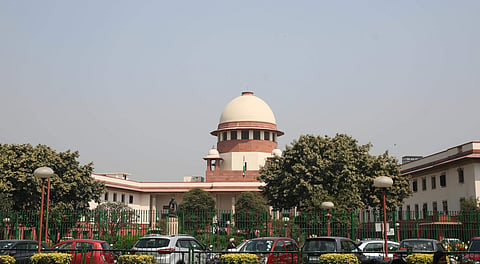Supreme Court allows passive euthanasia with permissible guidelines, recognises 'living will' of terminally-ill patient
NEW DELHI:In a verdict with far reaching implications for the terminally ill and their relatives, the Supreme Court on Friday recognised that a person in a persistent vegetative state can opt for passive euthanasia and execute a living will to refuse medical treatment.Saying that the right to live with dignity also includes smoothening the process of dying, a five judge constitution bench headed by Chief Justice Dipak Misra permitted an individual to draft a living will specifying that she or he will not be put on life support if they slip into an incurable coma.
The apex court laid down principles relating to the procedure for execution of advance directive or ‘living will’ and spelt out guidelines and safeguards to give effect to passive euthanasia in both circumstances, that is where there are advance directives and where there are none.“The directive and guidelines shall remain in force till Parliament brings a legislation in the field,” CJI Misra, writing the judgment for himself and Justice A M Khanwilkar, said.
The other three judges of the bench - justices A K Sikri, D Y Chandrachud and Ashok Bhushan - penned separate concurring verdicts in the combined judgment running into 538 pages.“In the 21st century, with the advancement of technology in medical care, it has become possible, with the help of support machines, to prolong the death of patients for months and even years in some cases. At this juncture, the right to refuse medical treatment comes into the picture,” the ruling said.
Justice Chandrachud, writing a separate 134-page verdict said, “Life and death were inseparable and it was necessary for the court to recognise that dignity of citizens continues to be safeguarded by the Constitution even when the life is seemingly lost... Dignity in the process of dying is as much a part of the right to life under Article 21. To deprive an individual of dignity towards the end of life is to deprive the individual of a meaningful existence.”
1. Who can draw up a living will
-Living will can only be executed by an adult who is of a sound and healthy state of mind and in a position to communicate, relate and comprehend the purpose and consequences of executing it
- Must be voluntarily executed without coercion or inducement and after having full knowledge or information. Consent of the individual in writing mandatory
2. Content of the living will
-Must clearly specify the circumstances in which withholding or withdrawal of medical treatment can be resorted to
-Should state that the executor understands the consequences of the document. Name of a guardian or a close relative should be specified if the executor becomes incapable of taking a decision
-Document should be signed by the executor in the presence of two attesting witnesses and countersigned by the jurisdictional Judicial Magistrate of First Class appointed by the District judge
3. Medical board to take the call
-For terminally ill, a medical board must be constituted by hospital or physician where patient is admitted
-If board reject permission to withdraw treatment, the executor/his family/treating doctor/hospital staff can file a writ in HC
-Executor can withdraw or alter the living will

